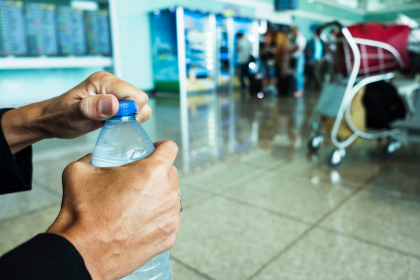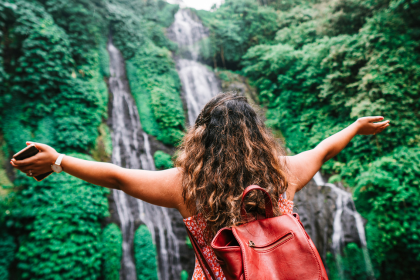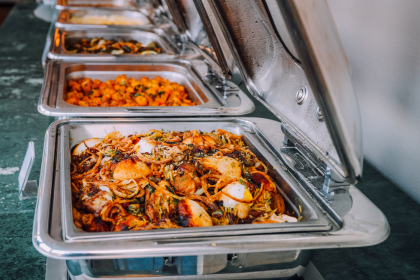Hello! This site contains affiliate links. If you click through these links and make a purchase, Everyday Resolutions will receive a little support at no extra cost to you. Your support is super-duper appreciated, thank you! Read here for full disclaimer.
Hydration
Hydration is crucial for our health and well being, and traveling can both alter our hydration habits and add causes of dehydration. So it’s important to think about how to stay well hydrated during your trip. Hydration is important for your brain, your digestion, your skin and your organs. Water helps plump up your skin cells minimizing fine lines and wrinkles. It also helps with flushing your system of impurities. Staying hydrated can help fight off jet lag, too!
Staying hydrated keeps your body and mind performing their best, allowing you to maintain optimal levels of alertness and focus during your travels. Dehydration can cause fatigue, dizziness, and headaches, which can negatively impact your overall travel experience. If you’re not feeling a hundred percent, a big glass of water might be the quickest remedy.
Why Focus on Hydration While Traveling?

Travel Itself is Dehydrating
- The first thing to recognize is that travel can be more dehydrating than everyday life.
- The travel itself puts us in environments such as airplanes, trains, and buses which have dry air (low humidity). Sitting in an airplane is like living in the desert and at high elevation. And often we’re drinking only the few tiny drinks they bring by. And those drinks are likely to be alcoholic or caffeinated, both of which contribute to dehydration.
- We also might become more dehydrated than normal because we are outdoors a lot, in the sun, or high humidity, moving a lot more than normal and not stopping to drink water as much.
- If we’re drinking more alcohol than normal, that only adds to the problem.
Climate and Altitude Affect Hydration
Traveling often involves exposure to different climates and altitudes. Proper hydration helps your body adjust to these changes more effectively.
- In hot climates, water aids in regulating body temperature and preventing heat-related illnesses like heat stroke or heat exhaustion.
- In high-altitude areas, where the air is thinner and oxygen levels are lower, hydration can alleviate symptoms of altitude sickness such as headaches and shortness of breath.
- In dry areas, you are more likely to notice that you are parched. Try to keep hydrating before you notice any symptoms of dehydration. Water helps keep your skin, organs and brain hydrated.
Jet Lag Relief

Long-distance travel across different time zones can result in jet lag, characterized by fatigue, difficulty sleeping, and disrupted circadian rhythm. Proper hydration can help alleviate some of the symptoms associated with jet lag, as it supports your body’s natural functions and promotes better sleep quality. For more info on fighting Jet Lag, click here.
Immune System Support
Traveling exposes you to various germs and bacteria, especially when using public transportation or visiting crowded places. Hydration plays a crucial role in maintaining a strong immune system, helping your body fight off potential illnesses and reducing the risk of infections.
Digestive Health

Travel often disrupts your usual eating habits, and trying new foods can sometimes lead to digestive issues. Drinking an adequate amount of water helps prevent constipation, supports healthy digestion, and reduces the chances of gastrointestinal discomfort.
Tips for Staying Hydrated
To ensure proper hydration while traveling, it’s essential to drink enough water throughout the day.
Start the Day Hydrated

Keep a glass of water beside your bed. Drink it when you first wake up to energize your body and hydrate to start the day. Be sure to drink plenty throughout the morning. Especially if you’re staying in an arid area or at elevation, you’ll naturally become more dehydrated as you sleep. And before you leave your hotel (or wherever you’re staying), there should be plenty of water or other beverages on hand.
Grab Water Any Time it is Offered

Many hotels have a large water dispenser in the lobby or by the pool. Make use of this and have a quick sip every time you pass by. This is a habit that will serve you well.
Water Before Bed
Have a big glass of water before you go to bed. That will help you end the day hydrated and to start the next day in good shape.
Carry a Refillable Water Bottle

- Bring an (empty) refillable water bottle in your carry-on baggage. Fill it with water after going through security, and then drink it while waiting to board and on your flight.
- Don’t try to bring a full bottle of water (or any other liquid) through airport security. They will make you throw it away or dump it out!
- Make use of opportunities to hydrate, such as during layovers, rest stops or wherever you come across clean drinking water sources. Refill your bottle.
- There is an incredible variety of refillable water bottles and you can choose one that suits the way you travel. There are some very cool ones that fold almost flat, making it easy to store them when not in use. Others have carabiners (or secure attachments for them) so they can easily be attached to the outside of a backpack or day bag. Figure out what works for you. You don’t need to keep buying (and throwing away) expensive tourist-priced water.
- This is my personal favorite water bottle… it is easy to hold, collapsible, comes with a carabiner, is BPA-free and available in many colors.

- Carry that refillable water bottle when out and about, refilling it when you have the chance. That will depend a lot on where you are. In some places, there may be more opportunity to buy clean water in bottles than to get it from a faucet. If that is the case, err on the side of staying hydrated.
Ask for Water at Meals

In many places, restaurants are discouraged from providing water, unless customers request it, in order to conserve water. In many places, asking for water with a meal means asking for bottled water, and you’ll be charged for it. That is annoying if you’re used to drinking free tap water, but it’s worth it to stay hydrated. You may be asked “sparkling or still.” Pick your favorite. You may find that beer is cheaper than water (and in many places beer is much cheaper than popular soft drinks or juices). But it’s not the best hydration solution.
Not a Water Lover?

- Add some fruit. Lemon makes a huge difference in my enjoyment of water. I also like a few slices of cucumber or melon or orange.
- Still not convinced? You can also add some hydration salts such as LMNT which also add a pop of flavor as well as a little sweetness from stevia.

Other Important Notes on Hydration
Sun Protection
If you are going to be outdoors a lot, hydration and protection from the sun go hand-in-hand. Long sleeves and a wide-brimmed hat will protect your skin, keep you cooler, and slow the loss of moisture from your body.

Water Safety
In most places this will not be a concern, but take note of places where water from faucets is generally not considered safe for drinking. In such places, there is usually widely available bottled water.
Water Purification
If you are going somewhere where clean water will not be available (usually this means you will be in back country where you cannot buy bottled water) and you are worried about hydration, there are a wide variety of filters and purifying options available from outdoors and camping stores.

Most of us are never going to need one of these options. I have only used them when backpacking in the US. But, the info is handy to have and, at the very least, packing a small purifying straw can add peace of mind to your travels. And, if you need to buy a new water bottle, you might want to consider getting one with a filter built in.
Generally, these can be broken down into the following categories:
- Filters, which pass water through a porous substance with very fine pores, filtering out impurities and many bacteria.
- Purifiers, which not only filter out bacteria, but kill viruses using either ultraviolet (UV) light or using chemicals.
- “Physical purifiers,” a relatively new product, which work like filters but have such fine pores so that they trap viruses as well as bacteria
- If you might only briefly be in a place where water purity is questionable, a battery-powered UV purifying straw might be a relatively inexpensive and packable option.
- You can also buy purification tablets which you put into your water.
Filtered Straw
Filtered Water Bottle
Purification Tablets
Diuretic Substances
Limit your intake of diuretic substances like alcohol and caffeine, as they can contribute to dehydration. If you are going to partake of those beverages, try to alternate one glass or bottle of water with one serving of alcohol or caffeine just to maintain a proper level of hydration.

Oral Rehydration Mix
Bring along a few packets of powdered LMNT rehydration (electrolyte) mix to help maintain hydration. (It is delicious! I drink some almost every day.)
Dehydration causes the problems it does largely due to the electrolyte imbalances it creates. This is what causes cramps. If you get dehydrated, adding electrolytes can help you recover quickly.
Foods for Rehydration
Lots of foods can also help you replenish your electrolytes. Here are a few that you might be able to find in your travels:
-
- avocados
-
- oranges, strawberries and
bananas
- oranges, strawberries and
-
- tomatoes, broccoli and
spinach
- tomatoes, broccoli and
-
- beans and potatoes
-
- almonds and peanuts
-
- olives
-
- yogurt
- and turkey
All that drinking will mean—you’ll need to urinate. Never pass up a good opportunity. It is always handy to carry a packet of tissues or these Stall Mates that I always have in my bag!
So, to sum up: Ensure proper hydration while traveling. It is essential to drink enough water throughout the day. Carry a refillable water bottle and make use of opportunities to hydrate, such as during layovers, rest stops, or whenever you come across clean drinking water sources. Start and end your day with a glass of water. Additionally, limit your intake of diuretic substances like alcohol and caffeine, as they can contribute to dehydration.
For more Tips on Healthy Travel, click here.
Live well. Be well.
Laura











